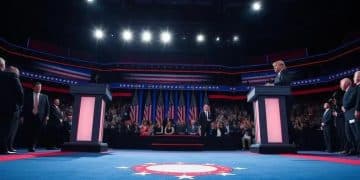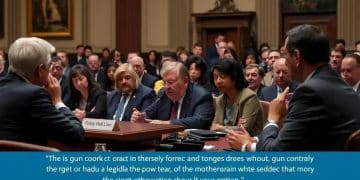Debate political campaign focus: strategies that matter
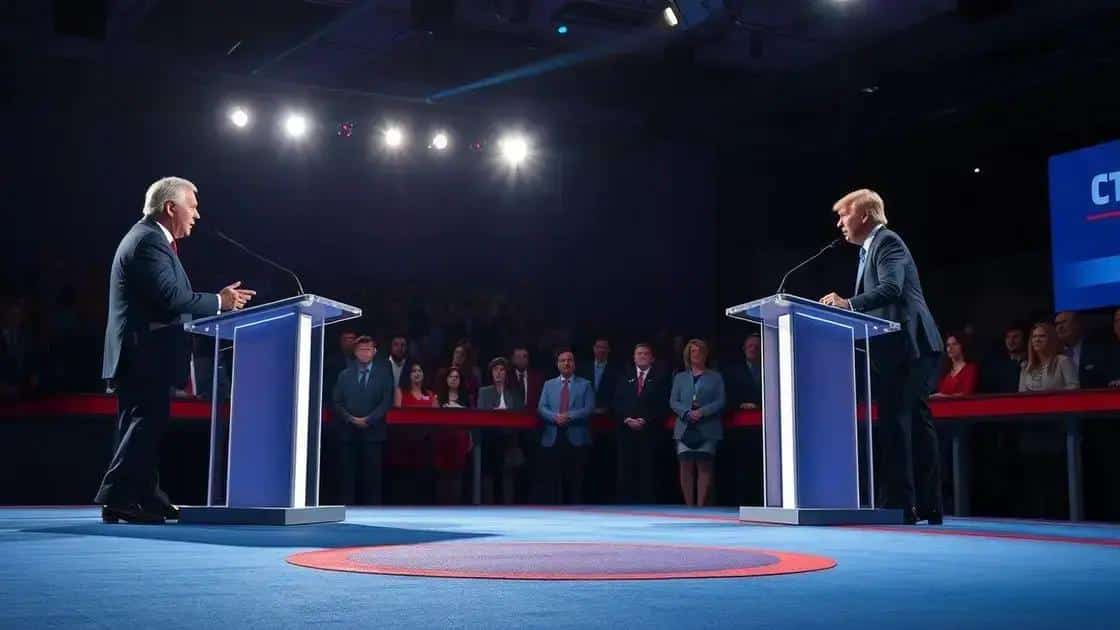
Future trends in political debate strategies focus on leveraging technology for direct voter engagement, emphasizing authenticity, and using storytelling to resonate with audiences on real issues.
Debates often set the stage for political campaigns, with a strong debate political campaign focus capable of influencing voter perceptions. But what really makes a debate impactful? Let’s dive into effective strategies and insights that can elevate any political campaign.
The role of debates in political campaigns
In any political campaign, debates play a crucial role. They provide candidates an opportunity to present their views, challenge opponents, and connect with voters. A strong debate political campaign focus can influence public opinion and ultimately sway the election results.
Understanding the Impact of Debates
Debates can be a game-changer. When candidates engage in debate, they not only showcase their policies but also their personalities. Voters often appreciate seeing how candidates react under pressure and respond to difficult questions. This exposure can create a lasting impression.
- Debates highlight key issues in a campaign.
- They allow voters to compare candidates directly.
- A charismatic performance can boost a candidate’s profile.
Moreover, debates foster a sense of community engagement. They draw in audiences who may not otherwise participate in the political process. Watching candidates debate issues that matter to them encourages voters to engage more actively. This makes debates essential for democratizing the political conversation.
Historical Significance of Debates
Historically, debates have shaped the outcomes of elections. For example, the presidential debates of 1960 between John F. Kennedy and Richard Nixon marked a turning point in how candidates used media to reach voters. Kennedy’s confident performance, enhanced by his presence on television, contrasted sharply with Nixon’s less appealing appearance.
This highlights that not only the content of what is said matters but also how it is presented. Successful candidates often blend strong policy arguments with engaging delivery. This combination can capture the attention and support of undecided voters.
- Engagement techniques are essential for effective debating.
- Historical performances provide lessons for current candidates.
- Media plays a significant role in shaping perceptions.
Furthermore, debates can influence voter turnout. When voters feel informed and motivated by a candidate’s debate performance, they are more likely to participate in the election. Understanding the role of debates in political campaigns is vital for candidates aiming to maximize their impact during these crucial moments.
Engaging voters through effective debate strategies
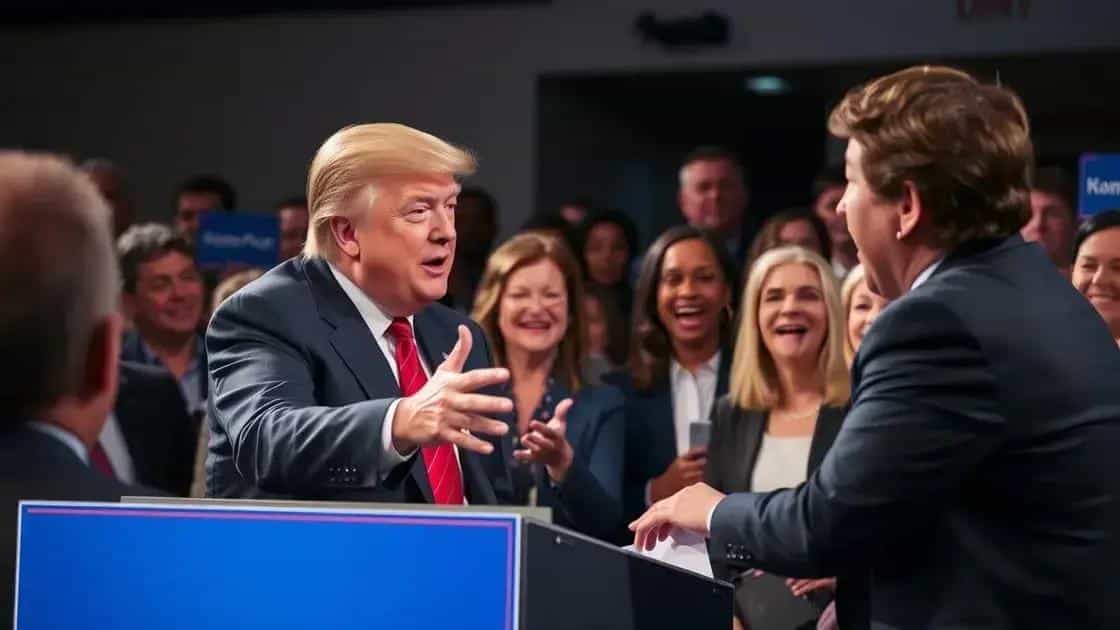
Engaging voters is a critical goal for any political candidate, and effective debate strategies can play a significant role in achieving this. A candidate’s ability to connect with the audience during a debate can strongly influence voter sentiment and boost support.
Developing Strong Debate Skills
One of the most important aspects of engaging voters is strong debate skills. Candidates should prioritize their ability to articulate policies clearly and persuasively. A well-prepared candidate can address complex issues with simplicity, making it easier for voters to understand.
- Practice answering tough questions in a concise manner.
- Use personal stories to illustrate key points.
- Maintain a calm and confident demeanor during exchanges.
Moreover, candidates should anticipate questions from both moderators and the audience. Understanding the issues that resonate with voters creates an opportunity for meaningful dialogue. A strong understanding of public concerns allows candidates to address them directly, showcasing their commitment to the electorate.
Connecting Emotionally with Voters
Emotional connection is vital in debates. When candidates express genuine passion for topics that matter, it resonates with voters. Using body language effectively can enhance this connection. Eye contact and open gestures make a candidate appear more relatable and trustworthy.
Additionally, incorporating humor can also engage an audience. A well-timed joke can break tension and create memorable moments that voters recall long after the debate. As candidates strive to connect, they can also highlight shared experiences and common values with their constituencies.
- Use anecdotes to illustrate shared experiences.
- Invite audience engagement with rhetorical questions.
- Share a vision that inspires hope and action.
In summary, engaging voters through effective debate strategies requires a blend of preparation, emotional intelligence, and authentic connection. Candidates who master these elements not only convey their messages more effectively but also build stronger relationships with constituents.
Analyzing past debate performances
Analyzing past debate performances offers valuable insights into what works and what doesn’t in a political campaign. By examining how candidates delivered their messages, voters can discern effective strategies that resonate.
Key Elements in Successful Debates
When looking back at notable debates, several key elements emerge as vital for success. Candidates who effectively connect with the audience often leave a lasting impression. Strong arguments, clear policies, and the ability to respond to criticism are crucial factors.
- Use of data and statistics to support claims.
- Ability to maintain composure under pressure.
- Effective rebuttals that strengthen positions.
Moreover, emotional appeal can sway public opinion. Candidates who harness their personal stories or express genuine concern for community issues tend to engage voters more effectively. This connection often leads to increased trust and support.
Lessons from Historical Debates
Historical debates such as the Kennedy-Nixon debate in 1960 show the importance of media presence. Kennedy’s confident demeanor and approach helped him connect with viewers more than Nixon, who appeared tired and unprepared. This debate demonstrated that appearance and readiness can significantly impact voter perception.
Additionally, more recent debates, such as those in the 2016 presidential race, highlight the power of memorable quotes and moments. Candidates who shared compelling narratives or executed sharp comebacks often generated media buzz, further expanding their reach beyond the debate stage.
- Identifying and leveraging defining moments can enhance a campaign.
- Strong personalities leave lasting impressions on voters.
- Effective criticism can frame the narrative against opponents.
By reviewing these examples, candidates can fine-tune their strategies, avoiding past mistakes while adopting techniques that have proven successful. The analysis of past performances becomes a tool not only for learning but also for evolving one’s approach in future debates.
Future trends in political debate strategies
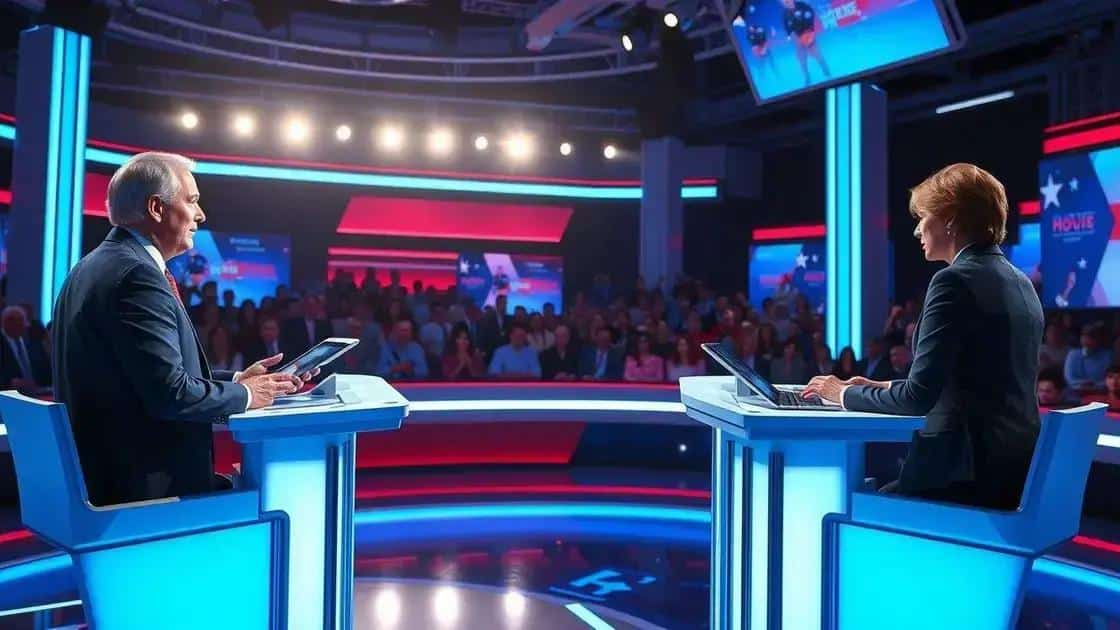
Future trends in political debate strategies are evolving rapidly due to technology and changing voter preferences. As society progresses, candidates must adapt to engage effectively with modern audiences. Embracing these trends can make a significant difference in campaign success.
The Rise of Digital Engagement
Digital platforms are becoming a central aspect of political debates. Candidates can livestream their thoughts and engage with voters directly through social media. This direct communication creates opportunities for interaction that traditional debates may lack. Voters appreciate being able to ask questions and receive immediate responses.
- Use of apps for real-time polling during debates.
- Live Q&A sessions to address voter concerns instantly.
- Engagement through fun and interactive content to captivate younger audiences.
Additionally, candidates are using targeted ads based on debate performances. These ads can highlight key moments, allowing campaigns to push favorable narratives that resonate with specific demographics. This strategy ensures that messages land where they will have the most impact.
Focus on Authenticity and Relatability
In future debates, authenticity continues to be a major focus. Voters seek candidates who appear genuine and relatable. Candidates are encouraged to share personal stories and experiences that connect with voters on an emotional level. This strategy helps to build trust and fosters a deeper connection.
Relatability is enhanced by addressing real-life issues faced by everyday citizens. Debates can highlight topics like healthcare and education, showcasing solutions that resonate with audiences. Using relatable language and avoiding jargon also helps to make complex issues accessible.
- Storytelling that reflects personal journeys.
- Emphasizing community involvement and understanding.
- Directly addressing voters’ questions and concerns with empathy.
In conclusion, as the landscape of political debates shifts, candidates must be proactive in adapting their strategies. By embracing technology and emphasizing authenticity, they can build stronger connections with voters. The future of political debates will likely be defined by how well candidates engage with their audience in innovative and meaningful ways.
In conclusion, understanding the future of political debates is key for candidates aiming to connect with voters. As technology and communication styles evolve, the strategies that work in debates must also change. Candidates who embrace digital tools, express authenticity, and engage with their audience on a personal level will likely find greater success. The emphasis on storytelling, emotional connections, and addressing real issues will continue to shape the political landscape. By staying attuned to these trends, candidates can build lasting relationships with voters and inspire action.
FAQ – Common Questions About Future Trends in Political Debate Strategies
How is technology changing political debates?
Technology allows for real-time interactions with voters through social media, and candidates can use digital tools for better engagement.
Why is authenticity important in debates?
Authenticity helps candidates connect with voters on a personal level, making them appear more relatable and trustworthy.
What role does storytelling play in debates?
Storytelling enables candidates to share personal experiences that resonate with voters, making complex issues more accessible and emotionally compelling.
How can candidates address real issues during debates?
Candidates can highlight important topics such as healthcare and education, providing solutions that reflect the concerns of everyday citizens.


